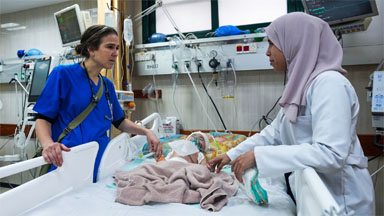
DEIR AL-BALAH (TIP): An international team of doctors visiting a hospital in central Gaza was prepared for the worst. But the gruesome impact Israel‘s war against Hamas is having on Palestinian children still left them stunned. One toddler died from a brain injury caused by an Israeli strike that fractured his skull. His cousin, an infant, is still fighting for her life, with part of her face blown off by the same strike.
An unrelated 10-year-old boy screamed out in pain for his parents, not knowing that they were killed in the strike. Beside him was his sister, but he didn’t recognise her because burns covered almost her entire body.
These gut-wrenching casualties were described to The Associated Press by Tanya Haj-Hassan, a pediatric intensive-care doctor from Jordan, following a 10-hour overnight shift at Al-Aqsa Martyrs Hospital in the town of Deir al-Balah.
Haj-Hassan, who has extensive experience in Gaza and regularly speaks out about the war’s devastating effects, was part of a team that recently finished a two-week stint there.
After nearly six months of war, Gaza’s health sector has been decimated. Roughly a dozen of Gaza’s 36 hospitals are only partially functioning. The rest have either shut down or are barely functioning after they ran out of fuel and medicine, were surrounded and raided by Israeli troops, or were damaged in fighting.
That leaves hospitals such as Al-Aqsa Martyrs caring for an overwhelming number of patients with limited supplies and staff. The majority of its intensive care unit beds are occupied by children, including infants wrapped in bandages and wearing oxygen masks.
“I spend most of my time here resuscitating children,” Haj-Hassan said after a recent shift. “What does that tell you about every other hospital in the Gaza Strip?”
A different team of international doctors working at Al-Aqsa Martyrs in January stayed at a nearby guesthouse. But because of a recent surge of Israeli strikes nearby, Haj-Hassan and her co-workers stayed in the hospital itself.
That gave them a painfully vivid look at the strain the hospital has come under as the number of patients keeps rising, said Arvind Das, the team leader in Gaza for the International Rescue Committee. (AP)
France‘s parliament seeks to ban hair discrimination affecting black women
PARIS (TIP): The French parliament on March 28 began debating a bill targeting workplace discrimination based on hair texture, which the draft law’s backers say targets mostly black women wearing their hair naturally.
Olivier Serva, an independent National Assembly deputy for the French overseas territory of Guadeloupe and the bill’s sponsor, said it would penalise any workplace discrimination based on “hairstyle, colour, length or texture.”
Similar laws exist in around 20 US states which have identified hair discrimination as an expression of racism.
In Britain, the Equality and Human Rights Commission has issued guidelines against hair discrimination in schools.
Serva, who is black, said women “of African descent” were often encouraged before job interviews to change their style of hair.
‘Target of discrimination’
The deputy, who also included discrimination suffered by blondes and redheads in his proposal, points to an American study stating that a quarter of black women polled said they had been ruled out for jobs because of how they wore their hair at the job interview.
Such statistics are hard to come by in France, which bans the compilation of personal data that mention a person’s race or ethnic background on the basis of the French Republic’s “universalist” principles.
The draft law does not, in fact, contain the term “racism”, noted Daphne Bedinade, a social anthropologist, saying the omission was problematic.
“To make this only about hair discrimination is to mask the problems of people whose hair makes them a target of discrimination, mostly black women,” she told Le Monde daily.
While statistics are difficult to come by, high-profile people have faced online harassment because of their hairstyle.
In the political sphere they include former government spokeswoman Sibeth Ndiaye, and Audrey Pulvar, a deputy mayor of Paris, whose afro look has attracted much negative comment online.
The bill’s critics say it is unnecessary, as discrimination based on looks is already banned by law.
“There is no legal void here,” said Eric Rocheblave, a lawyer specialising in labour law. Calling any future law “symbolic,” Rocheblave said it would not be of much practical help when it came to proving discrimination in court. (AFP)





Be the first to comment